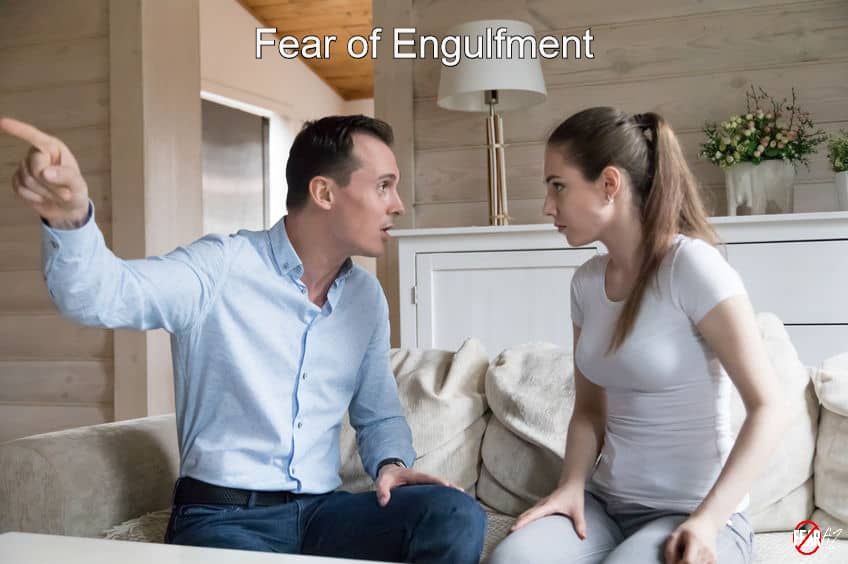Share This Article
Excessive Fear of Being Controlled or Losing Oneself
The term engulf, in itself, is usually associated with a negative. The meaning that generally comes to mind is ‘to be swallowed up.’
And being swallowed up is something to be feared.
The fear of engulfment, on the other hand, is the fear of over-immersing yourself in a relationship. Do you fear a situation where you might become dependent on one person for your very existence? A situation where you are nothing without that particular person, and you want that individual to feel the same toward you? You most likely have a fear of engulfment.
In essence, you’re afraid of either being swallowed up or swallowing up your partner in a relationship. Note, however, that the fear you have is not of being engulfed—it’s the thought that the engulfment will last a lifetime. As a result, you are fearful of either getting rejected or developing intimate relationships. You may struggle to enjoy any form of love: love from relatives, friends, or a partner.

What Causes Fear of Engulfment?
The root cause of fear of engulfment might be embedded in the fact that it is a social phobia. Social phobias are a form of anxiety disorder that hinder people from forming close or deep relationships with someone.
This fear of engulfment could be a result of different dysfunctional relationships. Having experienced a relationship that has gone sour can make creating a new one difficult. It could even be connected to relationships formed in childhood.
Fear of being abandoned could also contribute to a fear of engulfment. You may suffer in constant fear that love or warmth will suddenly vanish.
A fear of abandonment, in many cases, can be traced back to childhood. A child who has been abandoned physically or emotionally by an important adult figure could carry that fear into adulthood. Growing up in a dysfunctional family where nothing was permanent could also be a contributing factor.
People who are afraid of engulfment are also terrified of being controlled. They fear anything they perceive as dominating and might retreat from it. The fear of being judged by others is another subset of the fear of engulfment.
What Are the Symptoms of the Fear of Engulfment?
The fear of engulfment could manifest in several ways. If you suffer from this phobia, it could manifest itself in your intimate, professional, and even familial relationships.
Your fear of engulfment phobia may likely surface in instances when you long for an attachment with someone. Those suffering from this phobia have a heightened risk of sabotaging the relationships they care about the most. A deep emotional state of yearning could potentially trigger symptoms. People suffering from this fear risk shutting everything and everyone out.
Symptoms of this condition include:
- Serial dating
- Fear of commitment
- Difficulty in expressing feelings
- Inability to communicate
- Sabotaging relationships
Serial Dating
If you’re struggling with a phobia of engulfment, you may find communication to be easy only at the initial stages of a relationship. However, as the relationship grows more intimate, you might likely retreat from it and begin a new one with a different partner. And the cycle repeats. You tend to follow the same path of the previous relationship. Hence, a pattern of serial dating emerges.
Fear of Commitment
Adding to this phobia’s complexity is a pattern of short-term relationships, which only reinforces the fear of being engulfed in a commitment.
Difficulty Expressing Feelings
When you have a fear of engulfment, you may not see your feelings as valid. You might suddenly fall silent in a relationship, thereby sabotaging it. When your feelings go unnoticed by the other person, your thoughts turn to the need to end the relationship.
Inability to Communicate
Because you keep most relationships shallow, communication is neglected. Just like the relationship, every form of communication is kept shallow.
Sabotaging Relationships
Sabotaging can be done in several ways. For instance, accusing the partner of what hasn’t occurred, or just being intentionally dislikable.
Self-Help for Fear of Engulfment
Overcoming the fear of engulfment starts with embracing your vulnerabilities.
Life Is Full of Uncertainties
This phobia could stem from a fear of the unknown. As you strive to shield yourself from the uncertainties, you begin asking: Will they remain this way? Will I remain this way? The fear may begin to set in.
If possible, find ways to understand that in life there are no guarantees, and that’s OK. This especially holds true when it comes to human relationships. Nothing is predictable nor perfect. Embracing uncertainty is part of the thrill of life.
Making a conscious decision to forge a positive relationship may also help reduce the fear of engulfment.
Have Compassion for Yourself
Self-compassion may come easily to some, but not for people who suffer from a fear of engulfment. Phobia sufferers tend to have an increased level of rejection sensitivity.
If you suffer from this fear, know that you are worthy of love. Encourage yourself. Think of what you might do to help someone else in a stressful situation, and then direct those compassionate responses toward yourself. Doing things that help comfort you physically or mentally may also help. Take a walk, take a rest, exercise. Self-care is part of the process.
Take a Look at the Past
In most cases, a past traumatic event is the root of this phobia. If possible, when you think about what happened, try to extract details you can use to create the future you want. Doing so may help you realize the possibilities for a different narrative.
If you find your fear of engulfment may have resulted from something that occurred in childhood, professional therapy is encouraged. Such cases tend to be complicated and may require sensitive considerations. The psychology behind your fear of engulfment may be too complex to handle alone, so consult your medical provider.
Give It Time
Overcoming fear doesn’t happen in a day. This applies to everyone. If you keep this in mind, it might come in handy once you begin to address your phobia. The adjustment phase is always the hardest, but don’t give up. You may suffer setbacks along the way, but try not to be too hard on yourself. Setbacks are normal.
Have Goals
As you look at your past, if you can, try setting goals for yourself. Note what you want to happen differently in your life. Believe that you deserve companionships and relationships just as much as anyone else.
Sufferers of this phobia tend to be perfectionists. If you have this phobia, know that compromising on goals is OK. If you start feeling inadequate or feel you lack certain qualities, push back the thought. You deserve a love that is true, sincere, and deep.
Whenever you start feeling fear, remember your goals. Be patient. In time and with kindness from yourself and those you trust, you’ll find success.
Romantic comedies might not be the reality, but finding true love is a reality everyone deserves.




